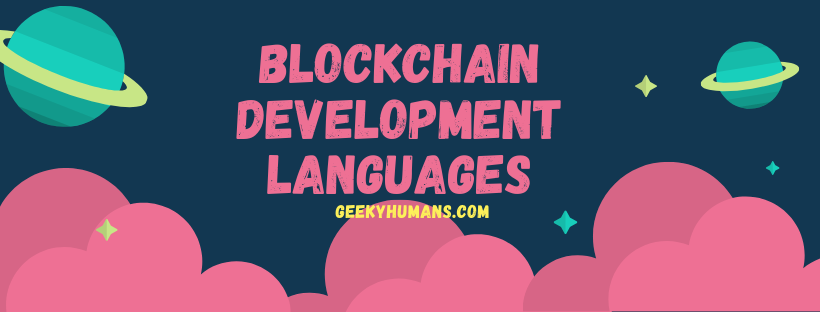
To help you understand and learn more about the best programming language for blockchain development, our experts, curated this guide, carefully outlining a generic list of best blockchain development programming language. Stay with us throughout today’s guide to have in-depth insight into this futuristic list of modern-day blockchain coding language. We aim at equipping you with every necessary information of the best programming languages for blockchain.
Few Challenges You Might Face While Entering the Blockchain Development World
-
Resource Management
In the Blockchain field, it is imperative for builders to ensure that they are familiar with real-time network requirements and well-versed with opportunities to handle queries. This, in turn, can be challenging for them to manage their resources reliably and effectively.
-
Isolation
Another problem faced by Blockchain developers is that all the hash functions operate in a deterministic manner. Meaning, they do not act in two various ways depending on the situations. In such a scenario, the development team has to select Isolation mechanism to bring non-deterministic nature into their blockchain solution.
-
Lower Performance
Last but not least, Lower performance is also one of the challenges of Blockchain programming that developers often have to face. Especially when choosing the right Blockchain development language. This is due to some of the Blockchain operations are parallelizable, while others are not. Meaning, it becomes necessary for them to bring a language on the table that is versatile in nature.
Now that you know what Blockchain programming issues you might encounter while heading your journey to Blockchain development, let’s jump to the core part of this article, that is, unveiling of the top Blockchain programming languages.
Programming Languages to Consider for Developing Blockchain Applications
C++
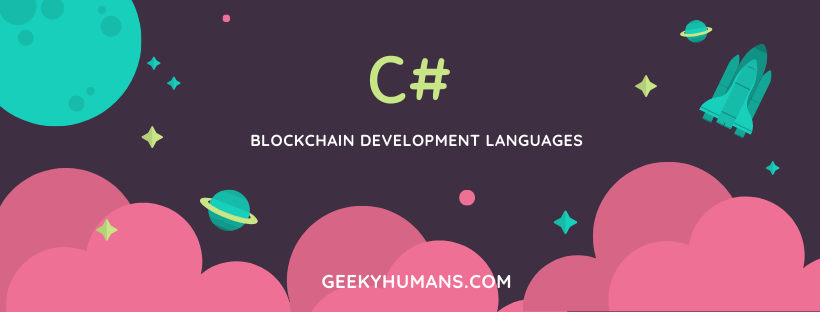
C++ was introduced back in 1985 by Bjarne Stroustrup, is the best programming language for cryptocurrency development. It is the best blockchain development programming language for definitive reasons like its primitive control over memory, advanced multi-threading capabilities, move semantics and core object-oriented features such as runtime polymorphism and function overloading. The object-oriented feature of this blockchain coding language provides developers, the ability to bind the data and the methods intended to manipulate them together, just like how blockchain binds blocks with cryptographic chains.
The language follows OOPs methodology and is highly used for building cryptocurrencies and Blockchain Projects such as Bitcoin, Litecoin, Ripple, Stellar, and EOS. Something that is a direct result of the following set of features and functionalities it provides:
-
- Efficient CPU management and memory control,
- Ease of running parallel/non-parallel threads,
- Option to move semantics for copying data effectively,
- Compile-time polymorphism for enhanced performance,
- Code isolation for different data structures, and so more.
Simplicity
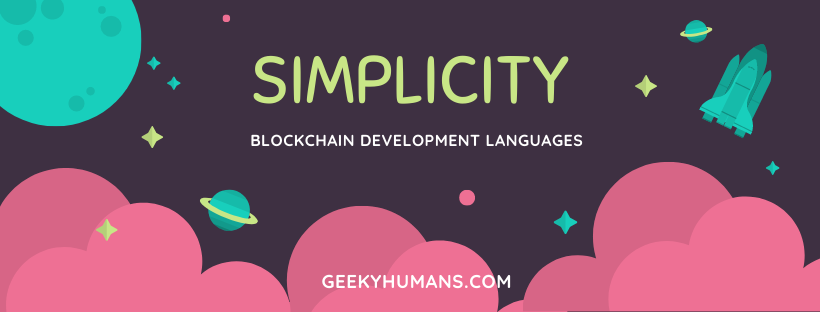
Simplicity is a blockchain programming language introduced by Russell O’Connor and hit the market for the first time in November 2017. It is a fairly high-level blockchain coding language aimed at minimizing complex low-level understanding of the Bitcoin Script, the integrated smart contracts language of the Bitcoin blockchain.
The language is said to be one of the best blockchain programming languages to write smart contracts by both open source developers and professional alike. By hiding low-level logical components from developers, Simplicity increases productivity in developers and can aid to a much faster development period.
Javascript
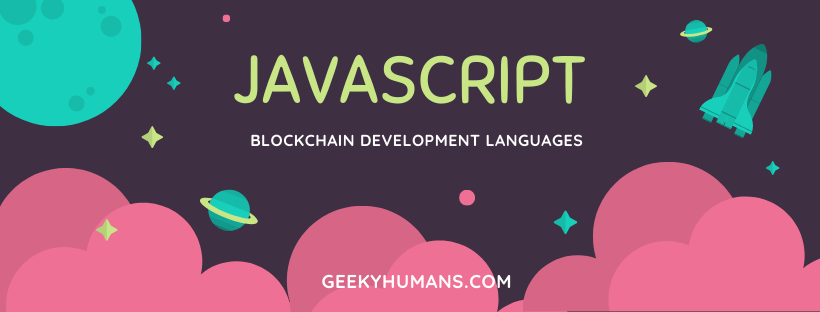
The undisputed king of the web, how JavaScript turned back its once unfavourable steep curve in favour of the blockchain builders is a mystery worth solving. Thanks to NodeJs’s innovative inception, creators now can develop highly-capable and creative blockchain applications with JavaScript.
The edge this blockchain programming language has over other blockchain programming languages is that it is already installed on most of the systems. All the web system utilizes JavaScript in a way or another. Thus, while developing your next blockchain with this blockchain coding language, you do not need to bother about integration and can concentrate exclusively on the application logic.
The language, in the form of frameworks like Node.js framework, provides developers various benefits such as:
-
- Easier and earlier entry to market,
- Enhanced Scalability,
- Availability of multiple JavaScript frameworks,
- No hassle of integration of respective resources, and more.
Python
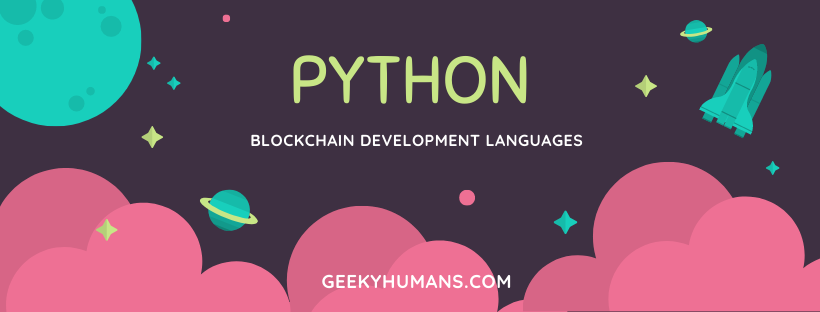
If you are a new developer looking to get your hands dirty in this amazing world of blockchain development, Python might turn out to be the best blockchain programming language for you. Although blockchains created on top of Python tend to underperform during complex cryptographic operations because of its interpreted nature, Python provides developers with the ability to prototype their ideas quickly. Moreover, Python also comes with the ability to write programs in an object-oriented approach, which can be utilized to cope with many of its performance related overheads.
The language was created in the year 1991, is widely used for dApps and Smart Contracts development because of ample of features it avails. Some of those features and functionalities are:
-
- Easy to learn and understand.
- Access to dynamic architecture.
- Perfect for both base and scripting approaches.
- Open-source support.
- Efficient for Prototyping, etc.
Steem, Hyperledger Fabric, and NEO are some of the popular Python-based Blockchain projects that are prevailing the market.
Solidity
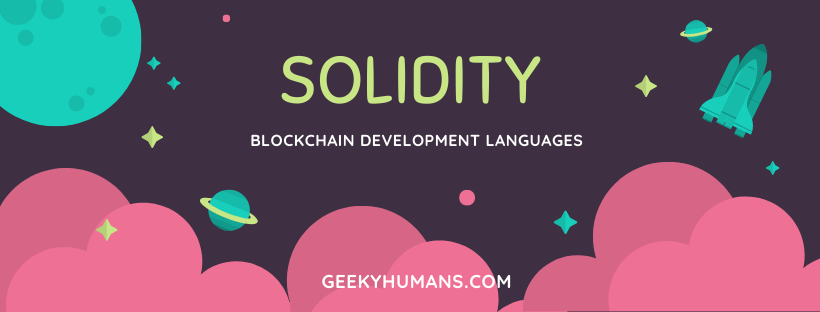
The fastest-growing blockchain programming language, Solidity was built keeping smart contracts in mind. It was primarily designed by the core team of Ethereum, the most widely used open-source blockchain platform. Solidity solves various problems faced by veteran blockchain developers with precise accuracy.
Solidity is statically-typed with syntactical components resembling ECMAScript. It compiles into bytecodes before execution and can change the program’s natural flow with carefully constructed semantic components. If you want to break into the advanced world of blockchain development, start learning this language as soon as possible.
The Solidity programming language was introduced by Vitalik Buterin, the mastermind behind Ethereum, and serves blockchain development companies with various benefits, like –
-
- Developer-friendliness.
- Accessibility to JavaScript infrastructures, debuggers and other tools.
- Statically typed programming.
- Possibility of inheritance properties in smart contracts.
- Precise accuracy, and more.
Rholang
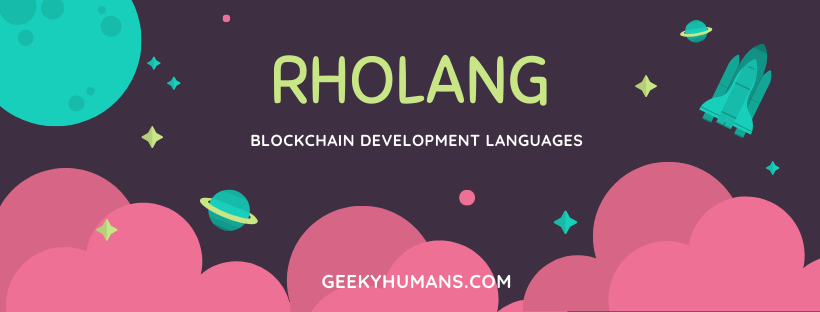
One of the best blockchain programming language to build smart contracts, Rholang is a new milestone in blockchain development. It is currently experiencing ongoing growth and intends to solve a variety of blockchain problems by taking a functional approach, rather than being object-oriented.
Rholang applications do not hold data in variables and change them further down the line such as C++ or Python. Instead, it evaluates the whole application as a series of functions and solves them according to the sequence. This makes Rholang the best blockchain programming language that utilizes the functional programming paradigm and comes with a highly-capable and elegant approach to blockchain programming.
C#

First hailed in high regards only within the boundaries of Microsoft, C# soon earned widespread popularity and established itself as one of the best blockchain programming languages. It gives open-source devs the quick ability to make highly portable code that will run across all devices.
The goal-oriented feature of this C# ensures developers don’t miss out a single bit of performance when developing their next blockchain. This blockchain programming language is also slightly identical to C++ and Java. So, a big community of veteran blockchain programmers can easily interpret C# systems and customize them.
-
- Some of the salient features of C# are as follows –
- It is open source.
- Its syntax is easy to understand and learn – thanks to its identicality with C++ and Java.
- It empowers developers to write portable code across devices.
- It is cost-effective to use because of BizSpark program.
Ruby
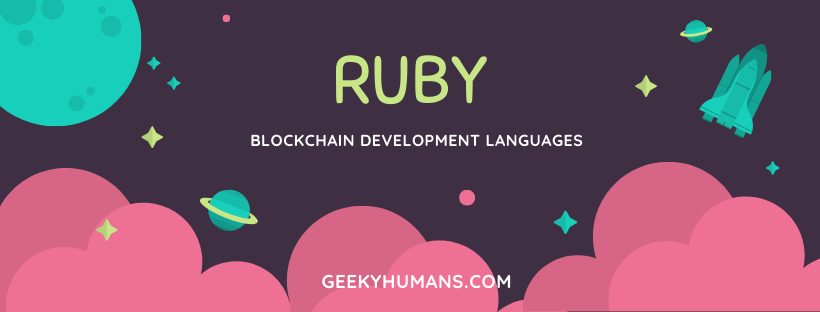
Ruby was developed by Yukihiro “Matz” in the year mid-1990s. Although quite old and tested by the market, Ruby gained momentum as a blockchain programming language in the last couple of years or more. Ruby is an interpreted high-level language with object-oriented features, much like Python, can be a viable blockchain coding language for infinite reasons. It provides the developers, an ability to prototype their vision rapidly using open-source third-party APIs and plugins.
Ruby ecosystem is thriving with loyal contributors since its inception as the de-facto web language beginning from the first half of this millennium. It is especially prevalent within the Asian developers, the most substantial fraction of open-source blockchain developers.
GO
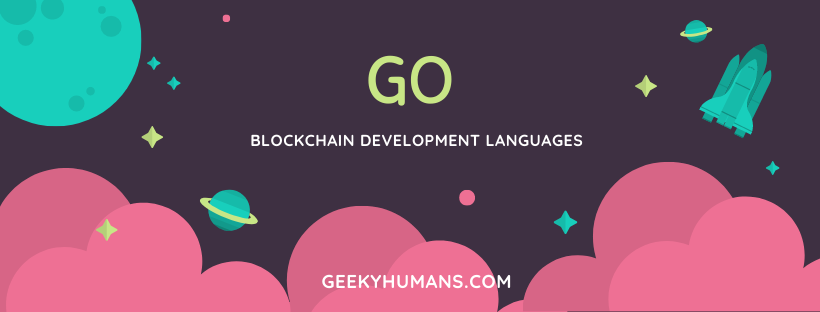
The brainchild of Robert Griesemer, Rob Pike, and Ken Thompson, pioneer of modern programming languages, Go is the best blockchain programming language for developing hyper ledger fabric. The statically-typed yet compiled language is on par the performance level required by a blockchain coding language. Go comes with every advanced feature you would require when making your first blockchain, namely classes and inheritance, generics, annotations, constructors, and exceptions.
GO offers top-notch concurrency support in blockchain applications, thanks to its brilliant implementation of channels and interfaces. Thus, it is one of the best programming languages for blockchain when it comes to developing a system that isn’t only efficient but also lightning fast.
Some features of Go are as follows:
-
- Memory safety.
- Garbage collection.
- Super strongly typed.
- Ultra-fast.
- Very easy to develop, after once you learn it.
PHP
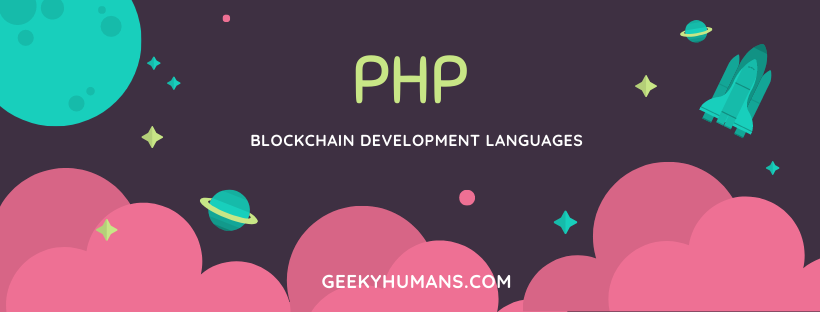
Introduced in the year 1995, PHP (Hypertext Preprocessor) is another programming language that every reputed mobile application development company recommend for creating Blockchain solutions.
Although dimmed not efficient for modern web anymore, PHP still covers the majority of web systems. It can be utilized to create simple to complex blockchain systems as well, thanks to its object-oriented features and a vast active open-source community.
If you are a new programmer trying for getting your hands dirty at blockchain coding, then PHP might turn out to be the best choice for you. A considerable number of PHP developers will guarantee a ready workforce in case you build something highly capable and intend on going corporate.
Scilla
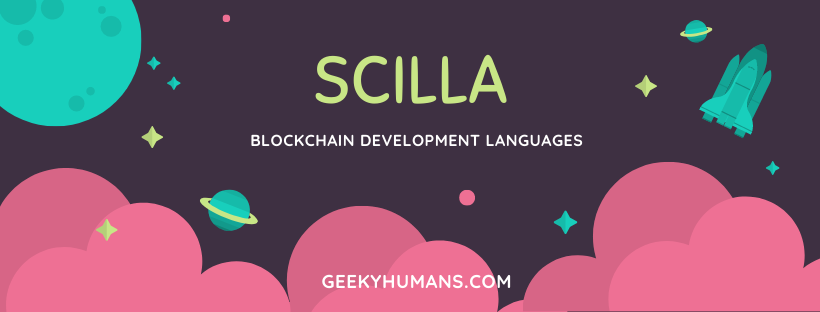
Another newly-emerged blockchain programming language, Scilla is maintained by Zilliqa and aims at minimizing safety risks and providing a formal verification for smart contracts. These formal verifications provide static guarantees of smart contracts before their commission to a blockchain.
Scilla decreases instances of error-prone codes substantially and also lowers the requirement for extensive audibility. The intermediate level blockchain coding language is compiled into bytecodes and so it is highly portable.
Vyper
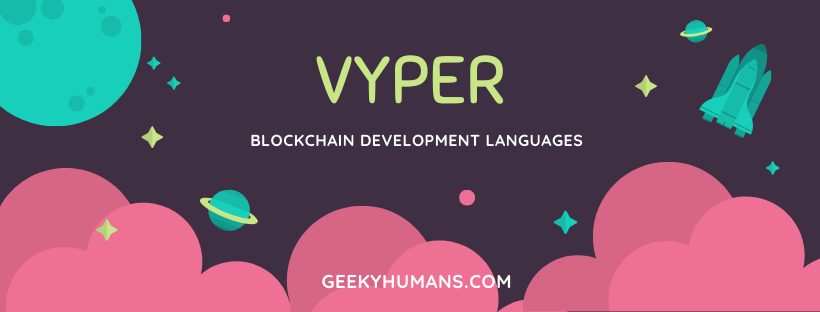
Vyper is a significantly new blockchain programming language aims at making writing smart contracts a breeze. It is mainly used for the EVM, just like Solidity. It does, however, differ considerably from Solidity regarding control structures and handling security problems.
Vyper removes much of the object-oriented functionalities present in Solidity, along with modifiers, recursive calling, and infinite loops. Vyper does so to avoid security problems that arise with their use. If you are looking for a simple blockchain coding language for writing smart contracts, Vyper is worth a look.
CX

The blockchain programming language of Skycoin, CX is in itself is a full-fledged programming language with the ability to operate as a contractual digital intermediary. It has simple error control features and offers advanced slices, pointers, and arrays for conveniently designing any blockchain.
CX is developed originally on top of Go, which saves CX systems from executing arbitrary codes, a significant issue associated with modern business software. The language integrates very well with OpenGL(Open Graphics Library) and aims at utilizing the GPU’s power most efficiently. It is the latest blockchain programming language you should try if you are looking for developing something new.
Rust
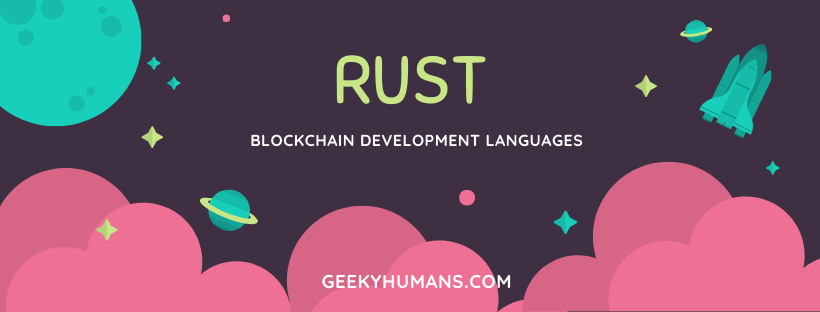
The newest blockchain programming language on the block currently, Rust aims at providing open-source devs the capability to develop fast and efficient blockchain systems. Rust is found to be exceptionally good when it comes to CPU-bound tasks. You can take either a functional approach or an imperative one with this programming language for developing your blockchain. The syntax of Rust is similar to C++.
Rust is one of the best programming languages for blockchain because of its highly-capable mechanism of handling mutable states. The Rust compiler provides an inspiring optimization of the blockchain. The fast, memory safe, and exclusively concurrent nature of this blockchain coding language makes it most efficient for developing real-world blockchains.
Some characteristics of Rust are as follows:
-
- Strongly typed.
- Safety oriented language.
- Supporting functional paradigms.
- Fast like C++
- Inheritance based on features.
- Small running environment.
Sophia

The eternity blockchain merges proof-of-work with proof-of-stake and emphasizes a connection to real-world objects in the Internet of Things. Contracts and their link to the world, the so-called oracles, are written in Sophia, a strongly typed version of ML. Sophia includes blockchain-specific features such as explicit contracts data structures developed into the language.
Java

The only language that can challenge the reign of C++ in the market is Java, and for good reasons so. Java is in many ways similar to C++ regarding its object-oriented approach and a huge community of third-party applications and platforms. The main reason to use Java as the de-facto blockchain programming language in the market is, however, its highly-capable portability.
Programs written in Java are portable across any computational device, as they do not rely on system-specific architecture, instead uses the universal JVM(Java Virtual Machine) for execution. This makes Java one of the best blockchain programming languages.
The language is derived from C-syntax and is widely used for developing sophisticated Smart contracts and Apps because of its following properties:
-
- Robust support for OOP (Object-Oriented Programming) methodology,
- Ease of memory cleaning,
- Availability of ample of libraries.
Some of the examples of Blockchain solutions developed using Java are NEM, IOTA, NEO, and Hyperledger Fabric.
SQL

SQL (Structured Query Language) is also one of the top blockchain programming languages to consider in this generation. The language was developed by IBM to make communication with databases like MySQL, SQL Server, PostgreSQL, and Oracle easier and efficient. It has more than 7 million developers in the industry and is used for building secure and effective enterprise solutions in the Blockchain domain. The clear evidence of which is Aergo.
Erlang
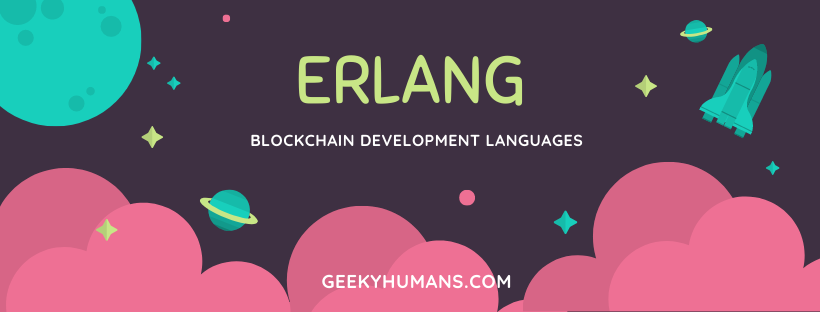
Erlang is one of the top Blockchain coding languages you should consider for a brighter future ahead. It is something that makes it the right choice for building peer-to-peer networks in a Blockchain environment. The language, though less popular than reputed names such as Java, JavaScript, and Python, serves Blockchain development companies with options such as:
-
- Unparalleled backend facility,
- Higher scalability,
- Immutability
- Inherent fault tolerance, and so on.
It is somewhat easy to predict that the blockchain technology will continue to revolutionize the way data and assets are transferred in modern businesses. It will have a huge impact on big corporations such as the banking industry and big pharma corporations shortly, just like it does currently on cryptocurrencies.
Plus, as industries delve more and more towards this exceptional technology, opportunities will be created for people with high-level skills of a blockchain programming language. We find now is the best time to dedicate yourself for learning the best blockchain programming languages.
Thanks for staying on this website throughout this long content. We hope you learned important insights in towards your journey to this innovative technology.
